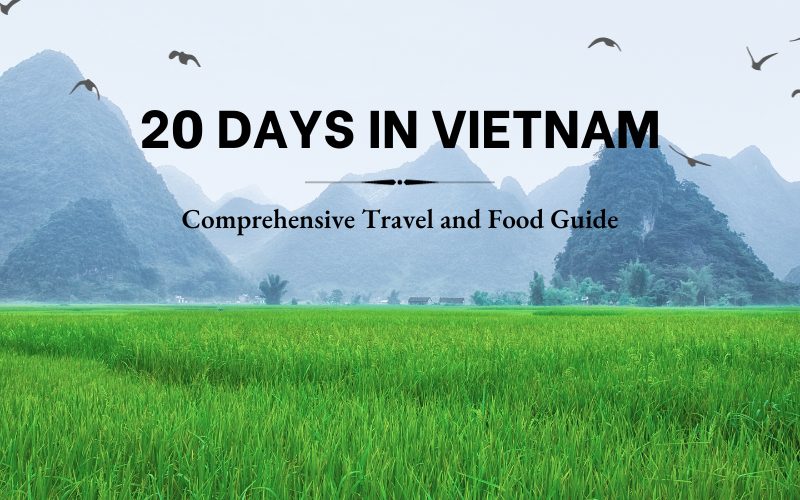
Embark on an extraordinary journey of 20 days in Vietnam, a destination that captivates with its cultural diversity, breathtaking landscapes, and exquisite cuisine. Whether you’re a soulful adventurer or a passionate foodie, this guide is crafted to help you make the most of your Vietnamese experience. Discover our top recommendations for the best itineraries to spend 20 days in Vietnam, leading you through vibrant cities, historic sites, and natural wonders. And for a treat to your taste buds, dive into the world of Vietnamese cuisine with our ‘Must-Try Vietnamese Dishes’ section, where you’ll find the essential dishes that make Vietnamese cuisine so unique and beloved. Get ready for a memorable adventure of 3 weeks in Vietnam filled with discoveries and flavors.
Perfect Itineraries for 20 Days in Vietnam
Embarking on a 20-day discovery of Vietnam is an exhilarating adventure that promises a wealth of diverse experiences. In this paragraph, we offer the best itinerary suggestions to fully enjoy these three weeks in Vietnam. From the vibrant Hanoi in the north, through the serene beauty of Halong Bay, to the colorful alleys of Hoi An and the bustling Ho Chi Minh City in the south, each step of your journey will be an immersion into the culture, history, and breathtaking landscapes of Vietnam. Whether you’re seeking relaxation on idyllic beaches, excursions in stunning landscapes, or authentic moments with the locals, these itineraries are carefully crafted to provide you with an unforgettable Vietnamese experience.
Itinerary 1: Explore the Grand Vietnam in 20 Days
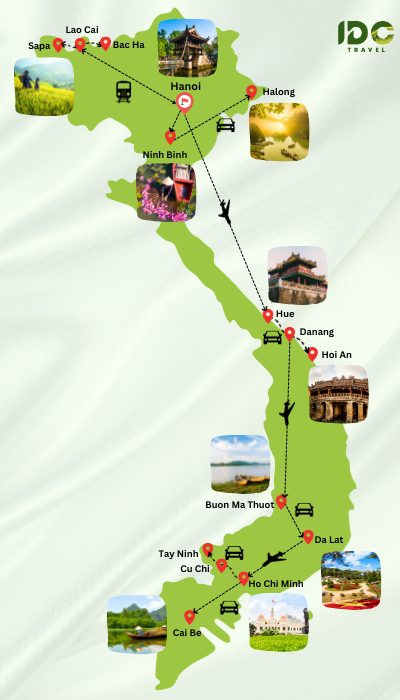
Day 1 – Arrival in Hanoi: Upon arrival at the airport, you’ll be taken to your hotel and have time to rest after a long flight.
Day 2 – Hanoi City Tour: Explore Hanoi by visiting the Ho Chi Minh Mausoleum and Museum, the One Pillar Pagoda, Tran Quoc Pagoda, the Temple of Literature, and the Ethnology Museum. Enjoy a cyclo ride in old Hanoi and watch a traditional water puppet show. Board the overnight train to Lao Cai.
Day 3 – Travel to Sapa: Arrive early in Lao Cai and drive to Sapa. After breakfast, hike to Cat Cat village to discover H’mong culture, mountains, and rice fields. Visit the old village, meet the locals, and admire a historic waterfall.
Day 4 – Sapa – Lao Chai – Ta Van – Bac Ha: Head to Lao Chai village, inhabited by Black H’mong. Explore the village, chat with locals, and see their handmade clothing. Continue to Ta Van, a Dzay ethnic village, then return to Sapa. In the late afternoon, proceed to Bac Ha and stay overnight with a Tay family, enjoying dinner there.
Day 5 – Immerse in the Ethnic Tradition: Visit a regional weekly market (Coc Ly on Tuesday, Sin Cheng on Wednesday, Can Cau on Saturday, Bac Ha on Sunday). Explore the ancient residence of the Hmong King and Ban Pho, known for corn liquor making. In the late afternoon, head to Lao Cai station for the overnight train to Hanoi.
Day 6 – Head to Ninh Binh: Transfer to Ninh Binh. In Van Long, choose between a bike or an ox cart to traverse the countryside. Enjoy a boat ride in Van Long reserve, admiring rice fields and cliffs.
Day 7 – Cruising on Halong Bay: Depart for Halong Bay. After about 3.5 hours, board a junk for an overnight cruise. Discover the UNESCO World Heritage-listed Halong Bay with its caves, islets, beaches, floating villages, and fish farms. Swim, sunbathe, or kayak.
Day 8 – Halong – Hanoi – Flight to Hue: Wake up early to admire dawn over Halong Bay. After the morning cruise, enjoy brunch on board before disembarking around 11 am. On the return to Hanoi, visit But Thap Pagoda and admire its statues, including the famous Thousand-Eyed, Thousand-Armed Quan Am. Then, head to the airport for your evening flight to Hue.
Day 9 – Hue City Tour: Visit the Vauban-style Imperial Citadel of Hue. Then, explore Dong Ba market to discover local specialties and famous conical hats. After lunch, take a sampan cruise to the Celestial Lady Pagoda and visit Emperor Tu Duc’s mausoleum. On the way back to Hue, stop at an incense-making village.
Day 10 – Hoi An Journey: Depart for Hoi An, passing through the Cloud Pass for panoramic views of Lang Co Beach and southern Danang. In Danang, visit the Cham Art Museum to discover Cham’s artworks. Explore the old quarters, the Fujian sanctuary, wooden houses, the Japanese-covered bridge, and the Pottery Museum.
Day 11 – Excursion around Hoi An: Bike to Tra Que vegetable village. Participate in farming activities, and enjoy a buffalo ride. Board a boat to cross the Thu Bon River and Cua Dai Sea, observe local fishing and navigate in a round boat. Visit the Cam Thanh coconut biological forest.
Day 12 – Hoi An – My Son – Flight to Buon Ma Thuot: Discover My Son and its Cham towers, located 69 km south of Danang. In the early afternoon, head to Danang Airport for your flight to Buon Ma Thuot. Visit the coffee museum with a tasting. Then, take a walk in an Ede ethnic village.
Day 13 – Buon Ma Thuot – Lak Lake: Spend the morning admiring Dray Sap and Dray Nur waterfalls, 30 km from Buon Ma Thuot. Return to Buon Ma Thuot for lunch, then depart for Lak Lake. En route, visit coffee and pepper plantations. At Lak Lake, enjoy an elephant ride in M’nong villages and a canoe cruise on the lake.
Day 14 – Lak Lake – Da Lat: Have some rest time until early afternoon before departing for Da Lat. Arrive in Da Lat by late afternoon.
Day 15 – Da Lat City Tour: Visit the city: Truc Lam Pagoda, Bao Dai’s Royal Palace, the railway station, and the cathedral. After lunch, discover the hand-embroidered painting workshop (XQ), the Valley of Love, the flower garden, and the Dalat market, where you’ll find souvenirs, salads, fruits, clothes, wool, etc.
Day 16 – Flight to Ho Chi Minh City: Head to the airport for your flight to Ho Chi Minh City. Explore the city by visiting the Reunification Palace, the old Saigon Post Office designed by Gustave Eiffel, and Notre-Dame Cathedral. Then, visit the Cho Lon Chinese district and the large Binh Tay market.
Day 17 – Saigon – Tay Ninh – Cu Chi – Ho Chi Minh City: Depart for Tay Ninh to discover the Cao Dai temple. Attend the daily noon mass. Then, take the road to Cu Chi. In the late afternoon, return to Ho Chi Minh City and spend the night at the hotel.
Day 18 – Cai Be Discovery: Head to the Mekong Delta, Vietnam’s “rice cultural reserve.” Upon arrival in Cai Be after about 2 hours, settle in at Mekong Lodge, located on the Mekong Riverbank. In the afternoon, go cycling in the village and taste tropical fruits. If you wish, participate in a cooking class before dinner.
Day 19 – Visit Cai Be Floating Market: Board a small boat for an excursion through the region’s natural delta channels. Explore the Cai Be floating market and visit a typical Vietnamese architecture house during this cruise. Your boat will then take you to An Binh Island, where you can discover a bonsai garden or a nursery, as well as a brick-making workshop. Return to Saigon.
Day 20 – Saigon Departure: Enjoy some free time and then head to the airport for your departure flight.
>>> Check here for the detailed tour program.
Itinerary 2: 20 Days in Vietnam Visiting All Essentials
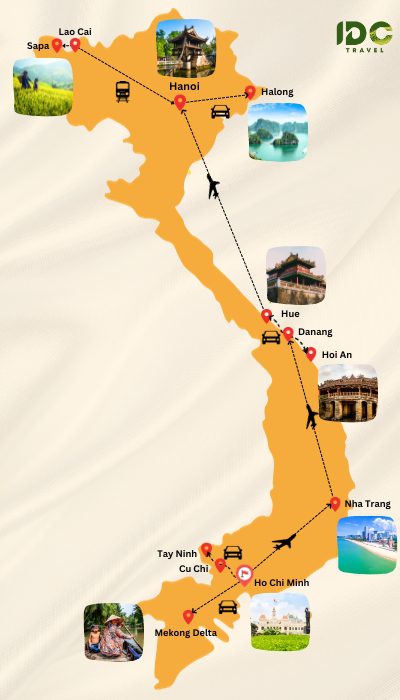
Day 1 – Arrival in Saigon: Upon arrival in Saigon, you will be greeted at Saigon airport by our guide. Then, you will be transferred to your hotel where you can relax and recover from jet lag.
Day 2 – Saigon City Tour: Explore downtown Saigon on foot by visiting the Notre Dame Cathedral, the Central Post Office, and the War Remnants Museum. Enjoy a relaxed sightseeing and shopping experience at Ben Thanh Market, but be sure to keep an eye on your valuables in this area.
Day 3 – Travel to Mekong Delta: Drive to Vinh Long. You will travel by motorized wooden boat between the islands, and perhaps in small paddle boats through the canals. The tour involves getting on and off boats, sometimes on unstable and slippery surfaces, sometimes without handrails or assistance, and up to 2 hours of walking to visit different sites on various islands. The cruise will end at a local house where you will spend the night.
Day 4 – Mekong Delta to Saigon Return: Continue visiting the canals, then return to Vinh Long and drive back to Saigon.
Day 5 – Saigon – Cu Chi Tunnels – Cao Dai Temple: Bring mosquito repellent. Go to Cu Chi, explore on foot for 2 hours, then visit Tay Ninh for the Cao Dai service. Have lunch nearby. Return to Saigon to spend the night.
Day 6 – Saigon to Nha Trang Flight: Transfer to the airport for your flight to Nha Trang. The rest of the afternoon is free at your leisure.
Day 7 – Nha Trang Island Excursion: Embark on a cruise around the islands of Nha Trang. Board other boats to get on board, often without assistance. The boats, old fishing vessels refitted, are basic but spacious.
Day 8 – Head to Hoi An: Take a flight from Nha Trang to Danang. Then, drive 30 minutes to the hotel in Hoi An to spend the night.
Day 9 – Hoi An Travel: Spend at least 2 hours walking in the old town of Hoi An. The afternoon is free at your leisure.
Day 10 – Explore My Son Sanctuary: Drive about 1 hour to the My Son Sanctuary, then 10 minutes to the Cham ruins. Explore on foot for 2 hours on muddy paths. Return to Hoi An to spend the night.
Day 11 – Transfer to Hue: Take the scenic Hai Van Pass route to Hue. Make stops in Danang to visit the Cham Sculpture Museum, the Dragon Bridge, and Marble Mountain. Discover natural caves and admire the view. Continue to Hue to spend the night.
Day 12 – Discover Hue City: Visit the Imperial City and the Royal Antiquities Museum in Hue, the Tomb of Emperor Tu Duc, and the Thien Mu Pagoda. Then, take a cruise on the Perfume River. In the late afternoon, transfer to Hue airport to fly to Hanoi.
Day 13 – Hanoi City Tour: Dress respectfully to visit the Ho Chi Minh Mausoleum. Be silent and respectful, without cameras or phones. Finish with a water puppet show.
Day 14 – Visit Duong Lam Village: Drive 1 hour to Duong Lam. Explore the village on foot for 1 hour, including the Mong Phu Temple, and have lunch in an ancient house. Then visit Mia Pagoda, Ngo Quyen, and Phung Hung temples, and return to Hanoi for the night.
Day 15 – Embark on Overnight Cruise on Halong Bay: Depart for Halong Bay, a UNESCO World Heritage site. Board a traditional boat to explore caves and caverns. If possible, swim, fish, climb for a view of the bay, or explore the caves by sampan.
Day 16 – Morning on Cruise – Overnight Train to Sapa: Continue cruising in the bay after breakfast. Return to the docks before noon and drive to Hanoi. Then take the overnight train to Lao Cai.
Day 17 – Exploration of Mountain Tribe Villages in Sapa: Arrive at Lao Cai station, and drive 1 hour to Sapa. Explore Sapa and its surrounding villages over two days. Expect muddy and steep terrain. Drive 45 minutes to Hang Da, and walk about 1.5 hours to Sa Seng village.
Day 18 – Sapa Visit: Take a light hike to Cat Cat village and the surrounding hydroelectric power station, about 2 hours of walking, including potentially slippery stairs.
Day 19 – Sapa Hike – Return to Hanoi: Lightly hike for 4 hours to the tribal villages around Sapa. Drive to Suoi Ho village, then walk to Ma Tra and Ta Phin villages. Transfer to Lao Cai station to take the overnight train to Hanoi.
Day 20 – Hanoi Departure Flight: Arrive at Hanoi station early in the morning. Enjoy some free time until your flight. Transfer from the hotel to the airport according to your international flight schedule.
>>> If you are interested in this itinerary, jump into our Panorama of Vietnam in 20-day tour.
Itinerary 3: Authentic Journey in Vietnam in 20 Days
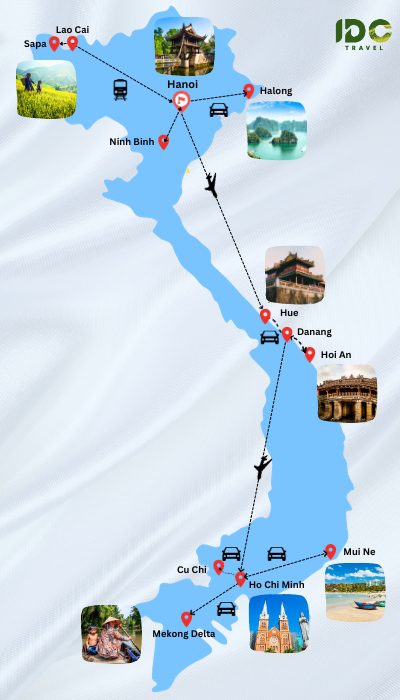
Day 1 – Arrival in Hanoi: After arriving in Hanoi, enjoy some free time to rest. In the afternoon, explore the old quarter of Hanoi and in the evening, attend a water puppet show.
Day 2 – Hanoi City Tour: Visit the Ho Chi Minh complex, including the mausoleum and the presidential palace. Discover the stilt house and the One Pillar Pagoda. Explore the Temple of Literature and the Tran Quoc Pagoda. Take a cyclo ride in the Old Quarter and visit the Ngoc Son Temple and Hoan Kiem Lake.
Day 3 – Hoa Lu – Tam Coc Excursion: Leave after breakfast for Hoa Lu – Tam Coc in Ninh Binh province. Explore the Tam Coc caves by sampan and admire the rice fields. Visit Hoa Lu, the ancient capital, and its sanctuaries. Return to Hanoi.
Day 4 – Halong Bay Overnight Cruise: Depart for Halong Bay. Take a break en route and arrive at Hon Gai Island around noon. Board a traditional junk and visit the Sung Sot Cave. Enjoy swimming or hiking at Titov.
Day 5 – Halong Bay – Hanoi – Overnight Train to Lao Cai: Practice Tai Chi at sunrise, then have breakfast. Visit Luon Cave by bamboo boat. Return to the junk to continue the cruise. Attend a cooking demonstration before lunch. Disembark at noon and take an overnight train to Lao Cai from Hanoi.
Day 6 – Trek to Y Ninh Ho – Lao Chai – Ta Van Village: Arrive in Lao Cai and transfer to Sapa. After breakfast, prepare for a trek to the Muong Hoa Valley. Hike to the Tavan village for a homestay among the Black Hmong.
Day 7 – Local Experience in Sapa: Walk to visit the Red Dzao and Hmong villages. Admire a waterfall and return by private car to Sapa. Have a local dinner and take the overnight train to Hanoi.
Day 8 – Fly to Hue from Hanoi: Arrive in Hanoi early in the morning and transfer to your hotel. Enjoy some free time before taking a flight to Hue.
Day 9 – Hue City Tour: Go for a guided tour of Hue’s sites, including three imperial tombs, the incense and conical hat village, and the Hue Citadel. Attend a Van An performance, then take a cruise on the Perfume River.
Day 10 – Hue – Danang – Hoi An Discovery: Depart from Hue to Hoi An after breakfast. Cross the Hai Van Pass and take a break at Lang Co. Visit the Cham Museum and Marble Mountain en route. Explore the old town of Hoi An.
Day 11 – Hoi An – My Son Sanctuary – Hoi An: Visit the My Son Sanctuary at 8:00 AM. Discover the Cham ruins and attend a traditional musical performance. Return to Hoi An for the night.
Day 12 – Hoi An – Tra Que Village – Cooking Class: Bike to Tra Que Village. Participate in gardening activities, take a foot bath, and prepare a local lunch with the family. Visit the Japanese tomb on the way back to Hoi An.
Day 13 – Flight to Ho Chi Minh: Enjoy some free time before your transfer to Danang airport for a flight to HCMC. Upon arrival, a driver will take you to your hotel in Ho Chi Minh City. Enjoy free time to explore the city.
Day 14 – Ho Chi Minh City City Tour: Visit the Cu Chi tunnels, then the War Remnants Museum in Ho Chi Minh City. Discover Saigon Central Post Office, Notre Dame of Saigon, and the Jade Emperor Pagoda. Finish at Ben Thanh Market.
Day 15 – Embark on Mekong Cruise – Can Tho: Depart for Cai Be for a cruise on the Mekong and the floating market. Discover local life and handicrafts. Visit a fruit farm, enjoy honey tea and traditional music. Explore a coconut candy workshop.
Day 16 – Enjoy the Floating Market: Early in the morning, join the Cai Rang floating market to discover local trade life and taste specialties. Return to Ho Chi Minh City for the night.
Day 17 – Head to Mui Ne: Depart for Mui Ne. Upon arrival, enjoy free time to relax on the beach and engage in activities like diving.
Day 18, 19: Mui Ne – Beach Relaxation: Spend the day relaxing on the beach and engaging in activities.
Day 20 – Ho Chi Minh City Departure Flight: Enjoy some free time after breakfast until your transfer to the airport for the return flight.
>>> Immerse in the authentic beauty of Vietnam with this 20-day tour, you will never regret your experience.
In addition to the itineraries for 20 days in Vietnam, there are a multitude of options for tailor-made tours, offering flexibility and customization according to your interests and preferences. These personalized trips can include unique experiences such as homestays in remote villages, Vietnamese cooking classes, hiking in the majestic mountains of the North, or excursions in the less explored regions of the Mekong Delta. You can also choose to integrate cultural activities, such as attending traditional shows or visiting historical sites, while having the opportunity to relax on the idyllic beaches of the Central and South. Tailor-made tours allow you to deepen your understanding of Vietnamese culture while exploring the country at your own pace, with itineraries adapted to your tastes and schedule:
- 11 Days in Vietnam: Best 2024 Itineraries
- Heavenly 14 Days in Vietnam: Suggested Itineraries for 2 Weeks
- 18 Days in Vietnam: Best Itineraries for 2024
- 19 Days in Vietnam: Hidden Gems & Famous Sights
Culinary Delights to Savor in 20 Days in Vietnam
Known for its freshness and delicately balanced flavors, Vietnamese gastronomy is a true celebration of the senses. During nearly 3 weeks in Vietnam, you will embark on a journey through the bustling streets of Vietnam and explore the country’s most irresistible dishes. So, sharpen your taste buds and get ready to drool over the culinary treasures of Vietnam!
Magic of Hanoi’s Street Food
The streets of Hanoi, Vietnam’s thousand-year-old capital, are a living theater of culinary culture. Here, every street corner unveils a new aspect of Vietnamese gastronomy, blending ancient heritage with contemporary creativity. Let’s walk together through the vibrant alleys of Hanoi to discover the flavors and aromas that make this city’s heartbeat.
Pho – The Soul of Hanoi
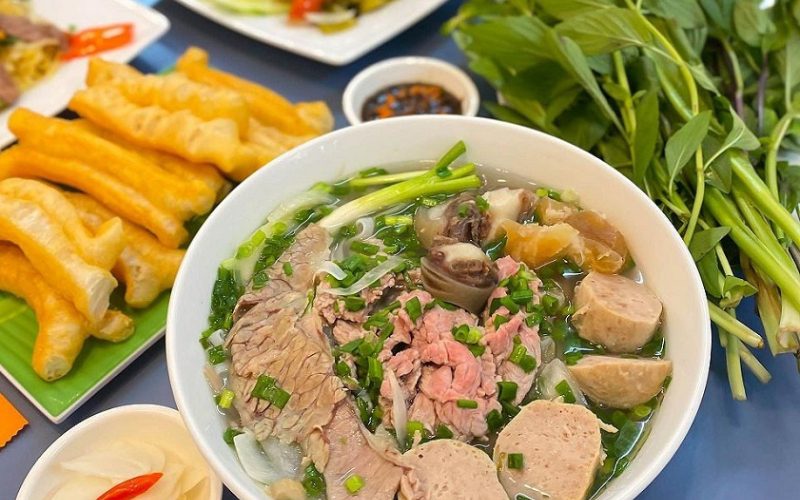
Pho – one of the most delicious Hanoi Food
- Pho, the quintessential Vietnamese noodle soup, has its roots in Hanoi. It consists of a clear, fragrant broth, typically made with beef, rice noodles, thin slices of beef or chicken, and an assortment of fresh herbs.
- Enjoying a bowl of Pho in a small local eatery, against the backdrop of the waking city, is an experience not to be missed. It’s a dish that can be enjoyed at any time, perfect for starting the day or for a light dinner.
Bun Cha – The Favorite Lunch
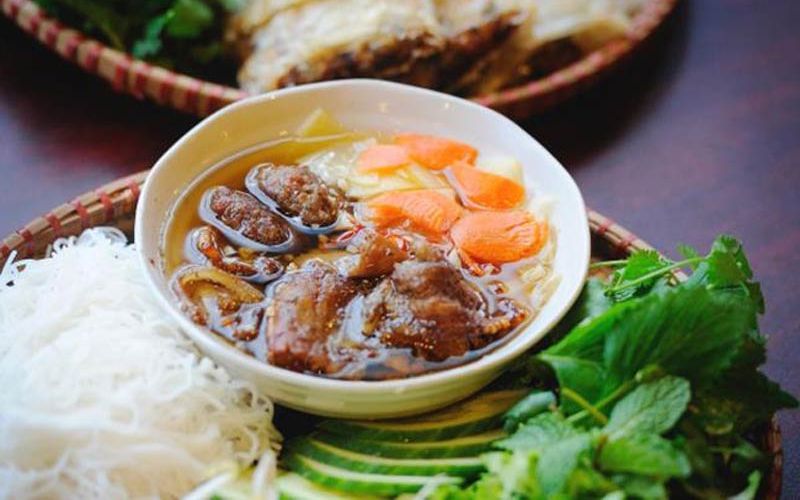
Bun Cha- an iconic food of Hanoi
- Bun Cha, made with rice noodles, grilled pork, and a sauce based on nuoc mam (fish sauce), is a culinary treasure of Hanoi. Served with an abundance of fresh herbs and raw vegetables, it offers a perfect balance of sweet, salty, and sour flavors.
- Joining the locals around an outdoor table for a Bun Cha lunch is an authentic experience, reflecting the friendly and warm spirit of the city.
Hanoi Coffee – A Unique Tradition
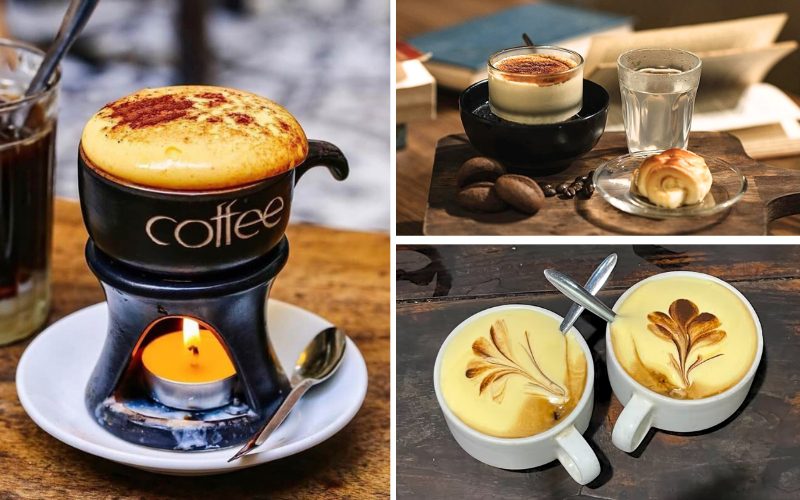
Egg coffee
- Egg Coffee: A Hanoi specialty where coffee is mixed with a frothy blend of egg and sugar, creating a rich and creamy drink.
- Street Cafés: Sidewalk cafés, often tucked into unexpected nooks, offer a relaxing break. Here, coffee is more than a drink, it’s a social ritual.
The magic of Hanoi’s streets lies in its ability to offer an authentic and unforgettable culinary experience. Each street and each food stall tells a story, sharing a piece of Vietnamese culture. Getting lost in the alleys of Hanoi means immersing yourself in a world where tradition meets modernity, where each bite is a journey in itself. You can also explore more of Hanoi’s impressive cuisine at 10 Most Authentic Hanoi Food to Savor.
Authentic Central Vietnam’s Cuisine
Central Vietnam is renowned for its unique and sophisticated cuisine. This culinary culture is deeply influenced by the region’s imperial heritage and is characterized by its intricate balance of flavors and exquisite presentations. Do not miss the chance to explore the heart of Central Vietnam’s culinary landscape during your 20 days in Vietnam, unveiling the authentic tastes and traditions that make this cuisine a distinguished and integral part of Vietnamese gastronomy.
Bun Bo Hue – The Soul of Hue’s Cuisine
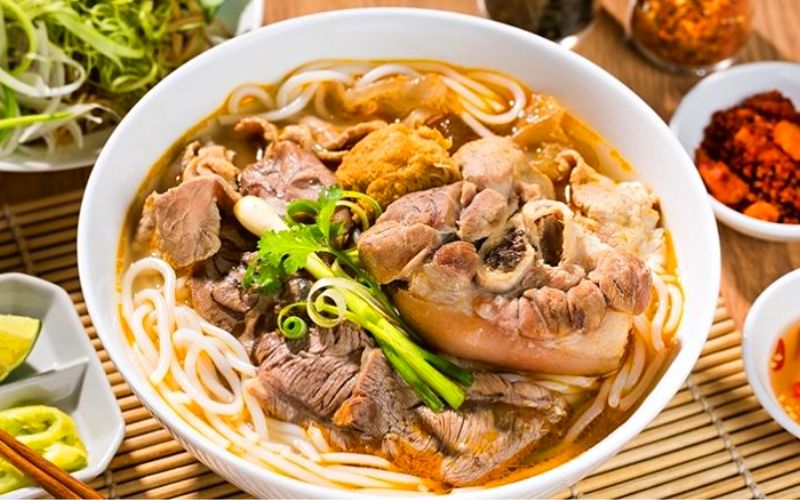
Bun bo Hue (rice noodle soup with beef)
- Bun Bo Hue is a spicy and aromatic noodle soup, served with beef, pork shank, vegetables, herbs, and spices. Unlike Pho, its broth is more robust and spicy, reflecting the richness of Hue’s cuisine.
- Eating a bowl of Bun Bo Hue in a small local restaurant, to the sound of the Perfume River, is definitely an unforgettable memory.
Nem Lui – Innovative Grilled Skewers
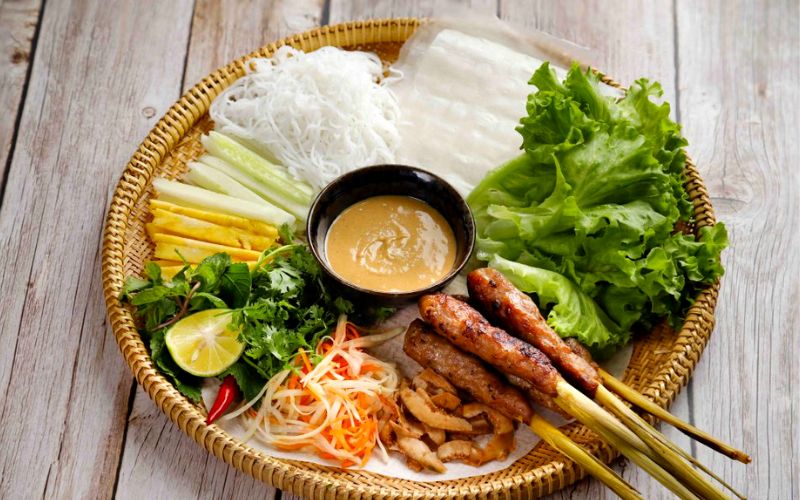
Nem lui (grilled minced pork)
- Nem Lui, grilled minced meat skewers, is served with fresh vegetables, aromatic herbs, and rice pancakes.
- Diners wrap the meat and vegetables in the pancake, creating a roll to dip in a special sauce. This dish combines the richness of grilled flavors with the freshness of herbs and vegetables, symbolizing the fusion of Hue’s culinary techniques.
Che – Colorful Sweet Soup
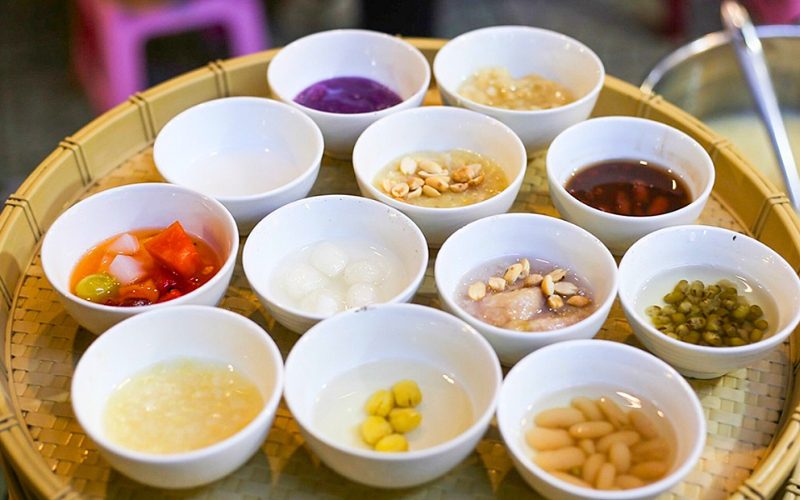
Che Hue
- Che Hue (Hue’s Sweet Soup) refers to a variety of traditional Vietnamese desserts originating from the city of Hue, famous for its rich and varied cuisine.
- These sweets are made with beans, tapioca, and fruits. They are often served in sweet syrup or with coconut milk. Exploring the different types of Che is a pleasant way to end a meal or to refresh oneself on a hot day.
Cao Lau – The Jewel of Hoi An
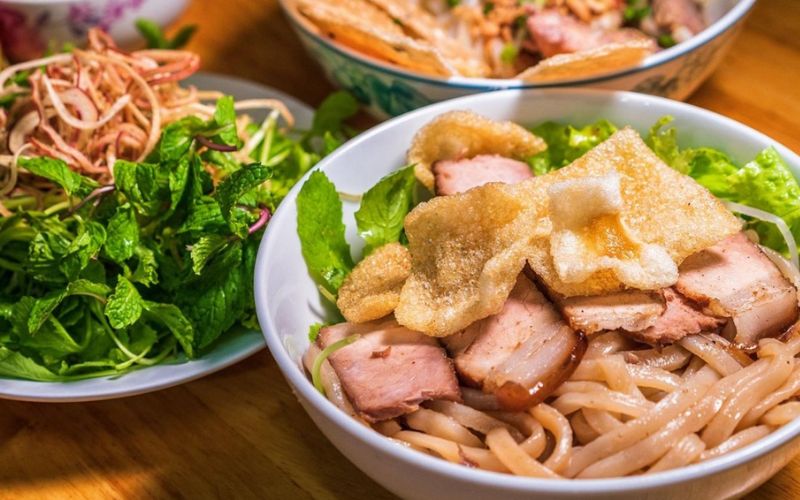
Cao Lau
- Cao Lau is an exclusive dish to Hoi An, consisting of thick noodles similar to udon, slices of roasted pork, crispy croutons, aromatic herbs, and a touch of soy sauce. Its uniqueness comes from the use of water from an ancient well in the city, adding a special flavor and texture to the noodles.
My Quang – The Nourishing Dish of the Locals
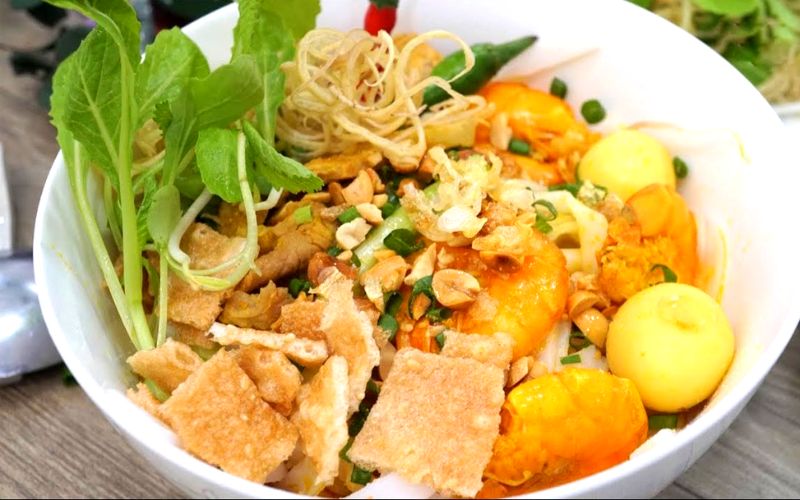
My Quang
- My Quang is a dish of rice noodles accompanied by shrimp, pork, eggs, topped with fresh herbs, and served with a scant broth. Known for its vibrant colors and earthy flavors, My Quang reflects the simplicity and authenticity of Hoi An’s cuisine.
Gastronomic Diversity in Ho Chi Minh City
Ho Chi Minh City, formerly known as Saigon, is a true cultural and culinary crossroads of Vietnam. This dynamic metropolis is renowned for its gastronomic diversity, blending Vietnamese traditions with foreign influences. From the bustling streets of District 1 to the colorful markets of Cholon, each neighborhood offers a unique culinary journey. Let’s discover together the culinary delights of Ho Chi Minh City.
Hu Tieu – Versatile Noodle Soup
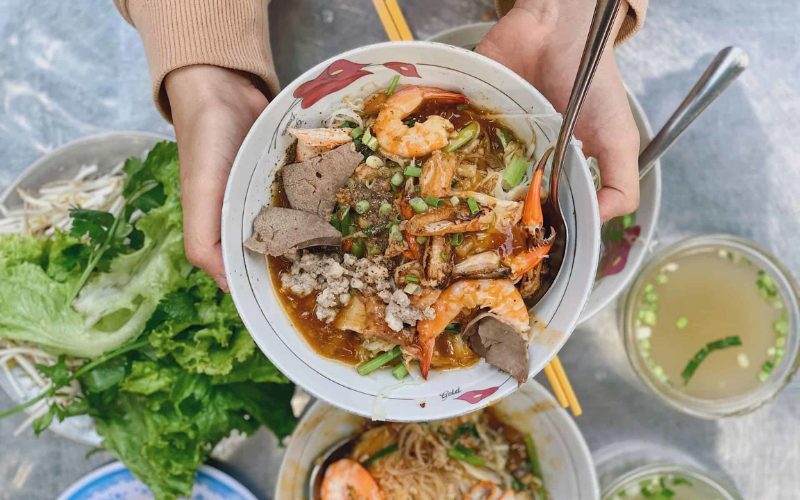
Hu Tieu
- Hu Tieu can be served as a clear soup or in a dry version (without broth). It is often prepared with pork, shrimp, and rice noodles, accompanied by fresh vegetables.
- This dish reflects the influence of Chinese and Cambodian cuisine, testifying to the city’s multicultural history.
Banh Mi Saigon – An Iconic Sandwich
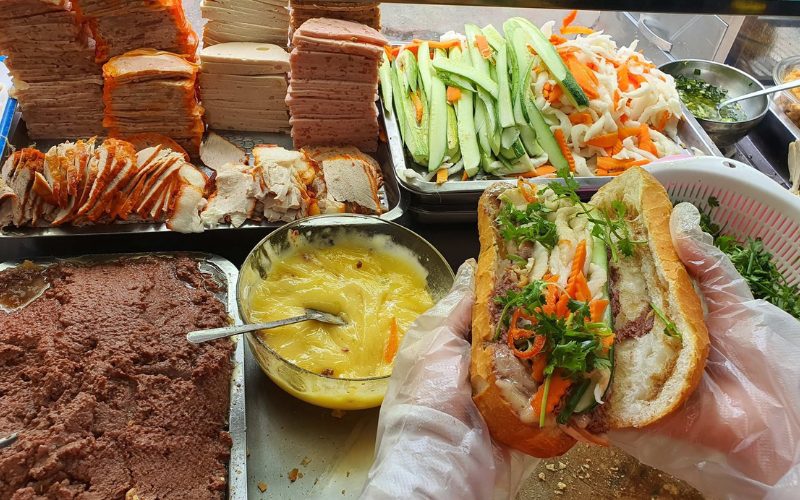
Banh Mi
Although available throughout Vietnam, Banh Mi in Ho Chi Minh City stands out for its variety of fillings and exceptionally crispy bread. Each Banh Mi stand offers its own version, with toppings ranging from classic pâté to more modern and inventive creations.
Com Tam – The People’s Dish
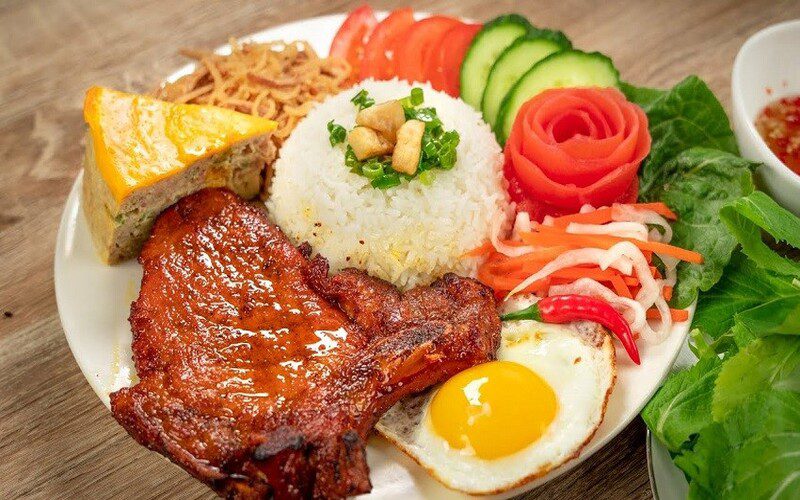
Com Tam
Com Tam, or “broken rice,” is a humble yet delicious dish, served with grilled pork ribs, a fried egg, pickled vegetables, and a sweet and sour sauce. It is a popular dish among locals, often eaten for breakfast or lunch, reflecting the daily life of the city.
Ho Chi Minh City stands as a haven for culinary enthusiasts, presenting a limitless array of tastes and culinary creations. The wide-ranging food culture of Ho Chi Minh City vividly mirrors its historical roots, contemporary vibrancy, and its globally-influenced progression. More dishes to savor at Saigon Street Food: 10+ Must-Tries for Visitors
As we wrap up our guide for 20 days in Vietnam, we hope to have ignited your excitement for this land of stunning contrasts and rich flavors. From vibrant cities to serene rural scenes, every day in Vietnam is a unique adventure. Our itineraries promise a journey through the country’s hidden gems and iconic landmarks, enriched by its diverse culinary culture. We invite you to carry a piece of Vietnam in your heart and memories. Let’s create your trip to Vietnam today! Feel free to reach out for your customized Vietnam travel experience!

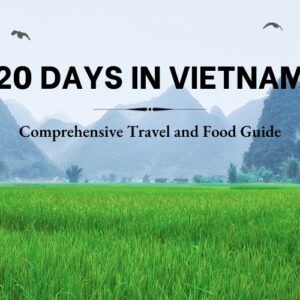
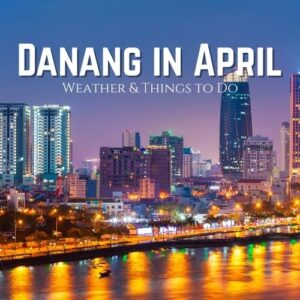
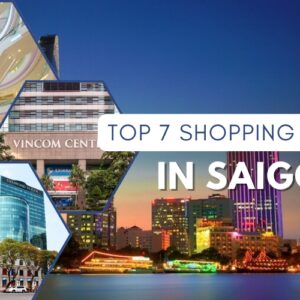
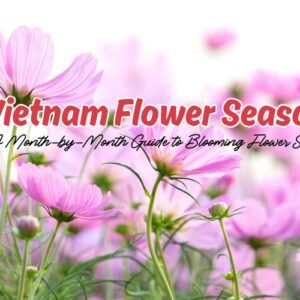
Hanoi cuisine is impressive. I tried Pho, fresh spring rolls, and Banh mi. Banh mi Hanoi is quite different from that in Ho Chi Minh City, different topping inside. Egg coffee is also a highlight of this city.
In Saigon, Com tam is the best, I think. Hu Tieu does not meet my expectation. Between Hu Tieu and Pho, I will choose Pho.
Hi Henry,
Thank you so much for your sharing! It seems that you have had a wonderful trip to Hanoi.
Hope to see you more in our beautiful S-shaped country.
Best regards,
IDC Travel Team.